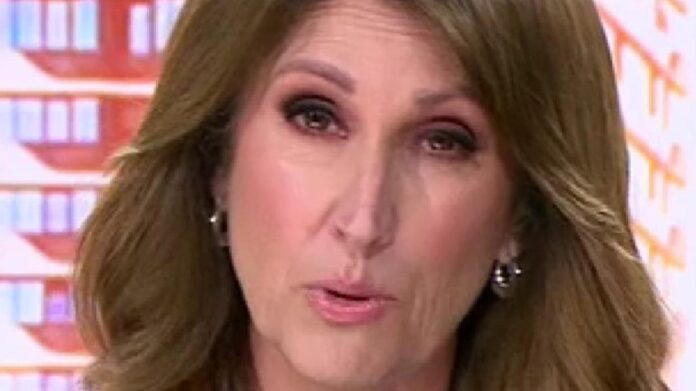[ad_1]
Sunrise host Natalie Barr has taken aim at the so-called “bracket creep” that’s ensnared hundreds of thousands more workers over recent years, as the prime minister faces mounting pressure to abandon planned reforms.
Stage three tax cuts are due to take effect from July 1, abolishing the 37 per cent income tax bracket and flattening the 32.5 per cent rate to 30 per cent for those earning between $45,000 and $200,000.
It would see huge numbers of Aussies instantly pay less tax on their incomes.
Millions to benefit
A report today in The Australian newspaper today reveals millions of average wage-earners will be rescued from bracket creep – describing a scenario where rising wages forces workers into higher brackets.
Those earning just above $100,000 a year would save up to $1300 per year in income tax, while those on $150,000 would get back $4000 and those earning more than $180,000 would get a $6000 reprieve.
The analysis shows almost one million workers would benefit by the end of the decade.
But the future of the reforms has been under a darkening cloud recently, despite Anthony Albanese committing to them at the last election.
“The PM is facing pressure from people within his own party for the tax cuts to be abolished or scaled back,” Barr said on the Channel 7 breakfast show today.
Albo ‘can’t back out’
National Party MP Barnaby Joyce, appearing on air, described it as “a slow-burning swindle on the Australian people” and demanded the government provide clarity on where it stands.
“Well, he never went to an election saying he was going to get rid of them and therefore we want him to honour his promise,” Mr Joyce told Barr.
“This is not the government’s money – it’s your money. And your effective tax rate has gone up, therefore the government is taking more of your money.
“The stage three tax cut is about giving some of your money back to you.”
The report in The Australian shows almost 700,000 workers fall into the highest tax bracket – 45 per cent – which is triple the number when the threshold was last lifted to $181,000 back in 2009.
“Using both median and mean measures of average full-time wage earners dating from 2007-08, the modelling shows the effective tax rate for an average wage earner has increased substantially over the past decade due to tax brackets not keeping up with rises in income,” the report read.
This morning, My Joyce said abandoning the measures would be “a swindle” on Aussie workers.
“It also means you go to work not for yourself, but you’re working Monday, Tuesday and possibly part of Wednesday for everybody else,” he said.
He said average income earnings “stacking bricks or fixing plumbing or being behind the counter at a bank” will continue to carry the lion’s share of the tax burden.
And Barr pointed out that dumping or watering down stage three would see “hundreds of thousands more [subjected] to bracket creep.
Calls for a concrete guarantee
According to reports, Treasurer Jim Chalmers asked officials late last year to advise on the consequences of scaling back the cuts.
And last week, Mr Albanese refused to offer a concrete “promise” that the stage three cuts would proceed as intended.
In a fiery interview with ABC Breakfast host Michael Rowland, he was invited several times to assure people there would be no changes but declined to do so.
That’s despite the government’s previous commitment to the measures – including in the lead-up to the last election.
On ABC Radio today, the PM insisted the government’s position has not changed.
A growing chorus of critics are heaping pressure on the government to water down the reforms, citing concerns about income inequality, a need to prioritise relief for low-income earners, and the risk tax cuts could drive up inflation.
It has been estimated that the stage three cuts would also cost the budget $230 billion over the coming 10 years.
Critics slam unfair model
Lyn Morgain, boss of the charity Oxfam Australia, appeared on ABC Radio this morning and labelled the stage three tax cuts “a travesty” and “simply a very poor policy choice”.
“At a time when members of the Australian community are unhoused as a result of fire, as a result of flood, it seems unacceptable … that we could be giving large benefits to those who already have a great deal,” Mr Morgain said.
Welfare groups say the budget revenue lost from the tax cuts could make an impact on cost-of-living pressures that hut the most vulnerable in the community.
The Grattan Institute has said a model that’s “less generous to the highest income-earners” could help almost halve the country’s $50 billion budget deficit.
Researcher and policy wonk Emma Dawson, executive director of the progressive think tank Per Capita, described the stage three cuts as “a fiscal booby trap”.
“The third stage of the Turnbull government’s income tax cuts were always bad economic policy, even in those distant pre-Covid days when they were designed by the then treasurer, Scott Morrison,” Ms Dawson wrote in analysis for The Guardian.
“While they may have been “affordable” according to the doomed economic forecasts of the time, they were never fair.
“Nor did they have any discernible purpose beyond effectively destroying the very concept of progressive taxation – a point I made on the night they were announced in May 2018.”
And Paul Bloxham, chief economist at HSBC, said an expected boost in spending as a result of the tax cuts could add to inflationary pressures, keeping interest rates higher for longer.
[ad_2]
Source link


